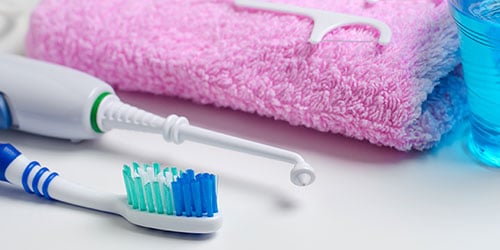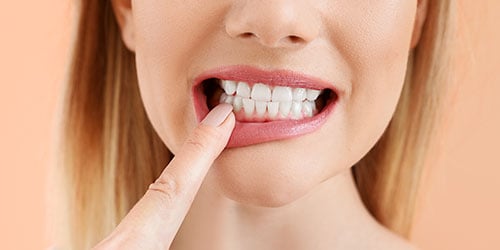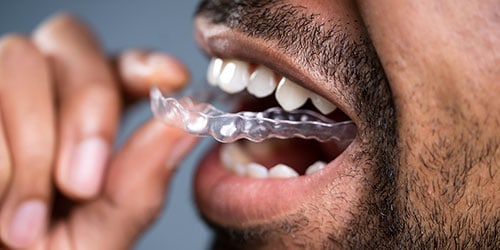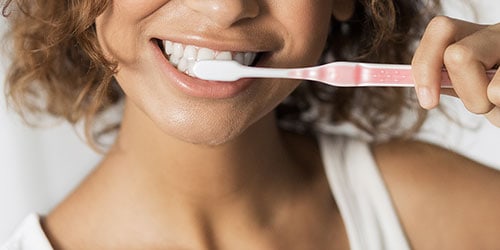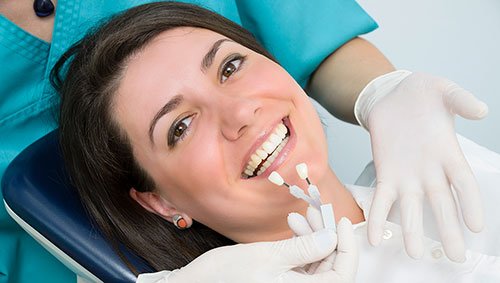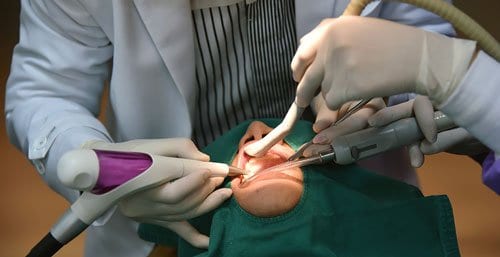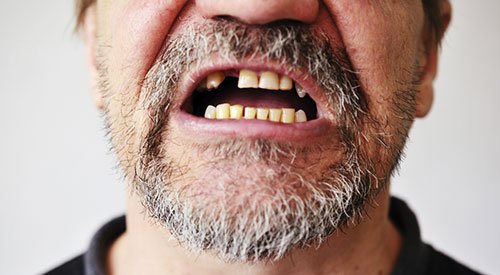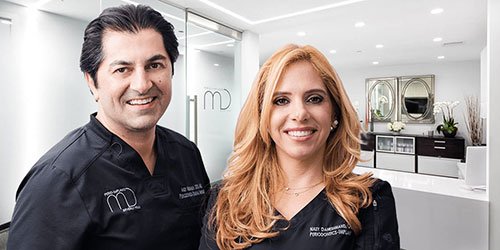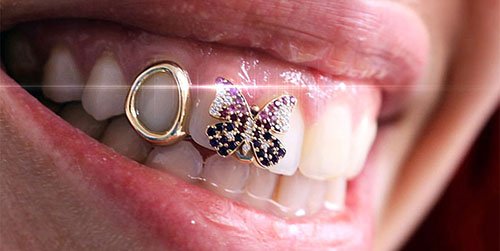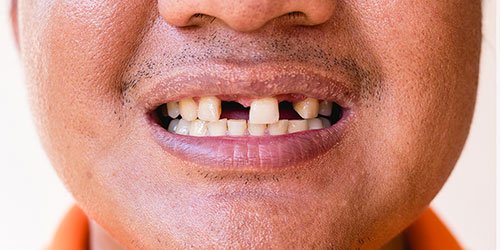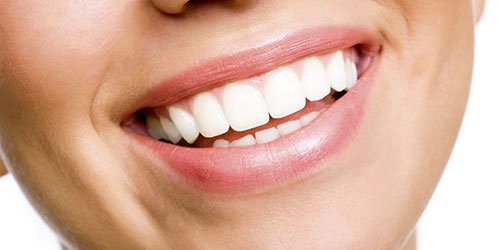
In recent years, we have seen dental patients become increasingly interested in how dental materials and products can impact overall health. Many have chosen to have metal fillings removed and replaced; others are concerned about suffering reactions to the materials used in dental implants. At MD Periodontics, we focus on patient health and safety and choose to use the materials and procedures we feel are in the best interests of the patients we treat.
We hope this article can help answer your questions about your dental implant options.
There are Two Types of Dental Implant Material
Dental implants are either metal (specifically titanium) or ceramic (specifically zirconia). Both types of implants have pros and cons, and it may be daunting trying to determine which is best for you.
Titanium Dental Implants
Titanium dental implants have been in use since the 60s, giving implant professionals decades of data on titanium’s viability in implant procedures. Most research and development on dental implants is based on titanium implant systems.
Titanium implants consist of a metal screw that goes into the jawbone, a metal post (abutment), and an artificial porcelain tooth (crown) that goes atop the abutment. The titanium screw merges with the bone in a process known as osseointegration, creating a permanent base for the implant.
Pros of Titanium Tooth Implants
As previously mentioned, titanium dental implants have been in use for over 65 years, meaning there is a lot of data on metal implants. They are widely trusted by both patients and dental professionals.

Durability
Titanium is a strong material. It’s resistant to external forces, making implant fractures rare. Titanium dental implants can last up to 25 years with proper dental care and maintenance.
High Success Rate
Studies have shown titanium implants to have a 10-year success rate of 97%.
Biocompatibility
Titanium implants have excellent biocompatibility with bone and gum tissues. It is highly resistant to corrosion and has low electrical conductivity.
Cost
In general, titanium implants cost about $300 less than their zirconia counterparts.
Cons of Titanium Tooth Implants
Metal Allergies
Although rare, some patients do have allergic reactions or hypersensitivity to titanium implants. In one study, only 0.6% of patients demonstrated a titanium allergy, so the risk is very rare. However, metal sensitivity can cause discomfort, inflammation, and, ultimately, implant failure.
Cosmetics
For those patients with soft tissues or a receding gum line, the darker metal part of a titanium implant can be visible or show through the gums.
Two-Piece Design
Because the titanium screw and abutment are two separate pieces, there is potential for moisture and bacteria to get in between the two pieces of the implant.
Not as natural looking
Though titanium implants do look very good, they simply do not look as natural as ceramic.
Zirconia Dental Implants
Zirconia is a crystal material colored to resemble a tooth. Despite being a crystal form of the transitional metal Zirconium, zirconia implants can be considered metal-free. Treating the Zirconium and converting it into Zirconium Oxide makes it a ceramic (which is why they’re also called “ceramic implants“).
Patients are becoming more partial to the idea of keeping metal out of their mouths, accounting for the rise of popularity in zirconia implants. Ceramic implants are FDA-approved and considered effective for many years. However, since they haven’t been in use as long as titanium implants, there isn’t as much data on their long-term durability.
Ceramic implants are a one-piece construction rather than a combination of screw and abutment.
Pros of Ceramic Tooth Implants

Aesthetics
Ceramic implants are comprised of a white material. So, patients with thin, soft tissues or a receding gum line don’t have to worry about the dark metal screw showing through.
When done by the best periodontists, ceramic implants are fundamentally indistinguishable from natural teeth. They look like real teeth, plain and simple.
Biocompatible
Research shows ceramic implants have low or weak inflammatory responses and have osseointegration equal to titanium implants.
Oral Health
Zirconia implants have less affinity for attracting and retaining plaque and bacteria than titanium implants. Plus, one-piece implants don’t leave a convenient place for bacteria to accumulate.
Hypoallergenic
Ceramic implants are metal-free, and therefore safe for patients with metal allergies or sensitivities. If you’re allergic to titanium, you don’t have to worry about side effects with zirconia implants.
Cons of Ceramic Dental Implants
Inflexibility
Because ceramic implants come in one piece, they can be trickier to place perfectly for less experienced periodontists and dentists. Titanium implants’ two-piece varieties allow angled implantation if needed.
Cost
Due to its higher manufacturing cost, zirconia implants generally cost a little more than titanium.
Availability
Because zirconia implants are newer in the US, not all dental practices offer them. At MD Perio, we were one of the first practices to begin using ceramic implants in the United States, so obviously, this is not an issue.
Ceramic vs Titanium Implants: What is the best material for dental implants?
Both implant materials have high success rates and biocompatibility. Both are FDA-approved. Both are greatly beneficial to people with missing teeth.
Ultimately, the best material depends on the patient’s needs and personal preference. If a small-diameter implant is needed, zirconia implants are troublesome and more prone to cracking. For single tooth replacement, ceramic implants blend in almost perfectly beside natural teeth. If all the natural teeth are missing, titanium implants are generally preferred.
While titanium has been used in implant dentistry for over half a century, ceramic is quickly gaining popularity. Ceramic implants are hypoallergenic, corrosion-resistant, and holistic dentistry compliant. And they look totally natural.
Ultimately, if you want to know the best dental implant material, schedule a consultation to discuss your specific needs with our implant surgery experts.
Why Choose MD Periodontics for your Dental Implants?
At our beautiful offices, MD Periodontics offers patients the best periodontic treatment that Los Angeles has to offer. Our holistic approach to dentistry ensures that the treatment you receive will utilize the least toxic materials available, the most advanced technology, and amenities including aromatherapy to reduce discomfort and stress during procedures. You’ll experience an atmosphere you would never expect to find at a dental office and results that you will love.
MD Periodontics is Beverly Hills’ premiere facility for dental implants. Our periodontists’ care and expertise attract clients not just from the Los Angeles area, but around the globe. A consultation with either Dr. Moshrefi or Dr. Daneshmand is the first step on your journey to a healthy solution to tooth restoration, and a smile you can happily share.
To schedule a consultation, click here or call us at (855) 245-1100.
At MD Periodontics, we take our patients’ safety seriously. Our facility’s Covid-19 patient safety procedures exceed all CDC recommendations. Masks are required in our institutes at all times.
We are conveniently located to patients throughout Southern California and the Los Angeles area. Our Beverly Hills office is conveniently located near West Los Angeles, Culver City, West Hollywood, Downtown Los Angeles, Marina del Rey, Pacific Palisades, Malibu, Manhattan Beach, Sherman Oaks, and Encino.
- What is Peri-implantitis and What to Do About It? - January 9, 2023
- Oral Health and Mental Health: More Connected Than You Think - September 2, 2022
- New Evidence on the Link between Gum Disease and Alzheimer’s - August 18, 2022
 (855) 245-1100
(855) 245-1100 Titanium vs. Ceramic Dental Implants, What You Need to Know in 2022
Titanium vs. Ceramic Dental Implants, What You Need to Know in 2022















